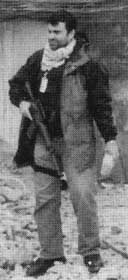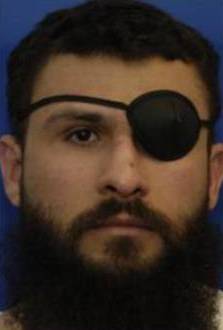
Abu Zubaydah is a Palestinian citizen and alleged terrorist born in Saudi Arabia currently held by the U.S. in the Guantanamo Bay detention camp in Cuba. He is held under the authority of Authorization for Use of Military Force Against Terrorists (AUMF).

Khalid Sheikh Mohammed, often known by his initials KSM, is a Pakistani extremist terrorist held by the United States at the Guantanamo Bay detention camp under terrorism-related charges. He was named as "the principal architect of the 9/11 attacks" in the 9/11 Commission Report.

A series of Islamist terrorist attacks linked to al-Qaeda were planned to occur on or near January 1, 2000, in the context of millennium celebrations, including bombing plots against four tourist sites in Jordan, the Los Angeles International Airport (LAX), USS The Sullivans, and the hijacking of Indian Airlines Flight 814.
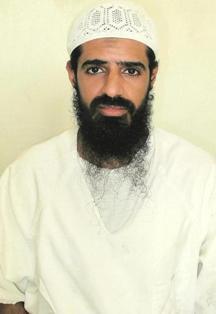
Walid Muhammad Salih bin Mubarak bin Attash is a Yemeni prisoner held at the United States' Guantanamo Bay detention camp under terrorism-related charges, and is suspected of playing a key role in the early stages of the 9/11 attacks. The Office of the Director of National Intelligence has described him as a "scion of a terrorist family". American prosecutors at the Guantanamo military commissions allege that he helped in the preparation of the 1998 East Africa Embassy bombings and the USS Cole bombing and acted as a bodyguard to Osama bin Laden, gaining himself the reputation of an "errand boy". He is formally charged with selecting and helping to train several of the hijackers of the September 11 attacks.

Waterboarding is a form of torture in which water is poured over a cloth covering the face and breathing passages of an immobilized captive, causing the person to experience the sensation of drowning. In the most common method of waterboarding, the captive's face is covered with cloth or some other thin material and immobilized on their back at an incline of 10 to 20 degrees. Torturers pour water onto the face over the breathing passages, causing an almost immediate gag reflex and creating a drowning sensation for the captive. Normally, water is poured intermittently to prevent death. However, if the water is poured uninterruptedly it will lead to death by asphyxia, also called dry drowning. Waterboarding can cause extreme pain, damage to lungs, brain damage from oxygen deprivation, other physical injuries including broken bones due to struggling against restraints, and lasting psychological damage. Adverse physical effects can last for months, and psychological effects for years. The term "water board torture" appeared in press reports as early as 1976.
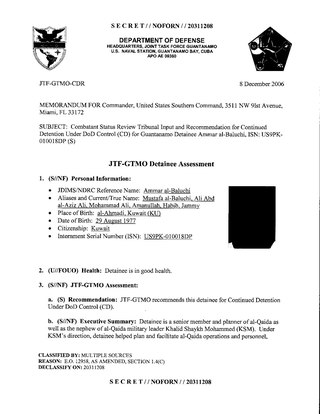
Ammar Al-Baluchi is a Pakistani citizen in U.S. custody at Guantanamo Bay detention camp. Charges against him include "facilitating the 9/11 attackers, acting as a courier for Osama bin Laden and plotting to crash a plane packed with explosives into the U.S. consulate in Karachi."
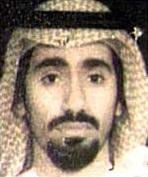
Abd al-Rahim Hussein Muhammed Abdu al-Nashiri is a Saudi Arabian citizen alleged to be the mastermind of the bombing of USS Cole and other maritime attacks. He is alleged to have headed al-Qaeda operations in the Persian Gulf and the Gulf states prior to his capture in November 2002 by the CIA's Special Activities Division.
Ali Abdul Saoud Mohamed is a double agent who worked for both the U.S. Central Intelligence Agency and Egyptian Islamic Jihad simultaneously, reporting on the workings of each for the benefit of the other.

Jose A. Rodriguez Jr. is an American former intelligence officer who served as Director of the National Clandestine Service of the Central Intelligence Agency (CIA). He was the final CIA deputy director for operations (DDO) before that position was expanded to D/NCS in December 2004. Rodriguez was a central figure in the 2005 CIA interrogation videotapes destruction, leading to The New York Times Editorial Board and Human Rights Watch to call for his prosecution.
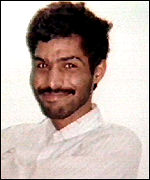
Mohamed Rashed Daoud Al-Owhali is a British-born Saudi terrorist. Al-Owhali is one of the four al-Qaeda members sentenced in 2001 to life without parole for their parts in the 1998 United States embassy bombings. The others are Mohammed Saddiq Odeh, Khalfan Khamis Mohamed, and Wadih el-Hage.
Fahd Mohammed Ahmed al-Quso, also known as Abu Huthaifah, Abu Huthaifah Al-Yemeni, Abu Al-Bara', Abu Hathayfah Al-Adani, Abu Huthaifah Al-Adani, Fahd Mohammed Ahmed Al-Awlaqi, Huthaifah Al-Yemeni, or Abu Huthaifah Al-Abu Al-Bara, was alleged to be a terrorist by American and Yemeni officials, and on the FBI Most Wanted Terrorists list. He was wanted by the FBI, Interpol, and the United States Department of State, which had offered 5 million dollars to anyone with information about him. He was killed by a US drone strike in Yemen on 6 May 2012.
Hassan Ghul, born Mustafa Hajji Muhammad Khan, was a Saudi-born Pakistani member of al-Qaeda who revealed the kunya of Osama bin Laden's messenger, which eventually led to Operation Neptune Spear and the death of Osama Bin Laden. Ghul was an ethnic Pashtun whose family was from Waziristan. He was designated by the Al-Qaida and Taliban Sanctions Committee of the Security Council in 2012.
The CIA interrogation videotapes destruction occurred on November 9, 2005. The videotapes were made by the United States Central Intelligence Agency (CIA) during interrogations of Al-Qaeda suspects Abu Zubaydah and Abd al-Rahim al-Nashiri in 2002 at a CIA black site prison in Thailand. Ninety tapes were made of Zubaydah and two of al-Nashiri. Twelve tapes depict interrogations using "enhanced interrogation techniques", a euphemism for torture. The tapes and their destruction became public knowledge in December 2007. A criminal investigation by a Department of Justice special prosecutor, John Durham, decided in 2010 to not file any criminal charges related to destroying the videotapes.
Deuce Martinez is an American intelligence professional. "Deuce" is not his given first name, but a nickname that was used in the first newspaper article naming him. He was involved at the start of the Central Intelligence Agency's Rendition, Detention and Interrogation program of "high-value detainees," including Abu Zubaydah, Ramzi bin al-Shibh, Abd al-Rahim al-Nashiri, and Khalid Sheikh Mohammed.

Abu Zubaydah is a Saudi citizen who helped manage the Khalden training camp in Afghanistan. Captured in Pakistan on March 28, 2002, he has since been held by the United States as an enemy combatant. Beginning in August 2002, Abu Zubaydah was the first prisoner to undergo "enhanced interrogation techniques." Since the Spanish Inquisition, these practices have been characterized as torture by many familiar with the techniques. There is disagreement among government sources as to how effective these techniques were; some officials contend that Abu Zubaydah gave his most valuable information before they were used; CIA lawyer John Rizzo said he gave more material afterward.
In the aftermath of the September 11 attacks on New York City and Washington, D.C., by the al-Qaeda terrorist group, a number of investigations were conducted to determine what intelligence may have existed before the attacks and whether this information was ignored by authorities.

Manhunt: The Search for Bin Laden is a 2013 documentary film directed by Greg Barker that explores the Central Intelligence Agency's investigation of Osama bin Laden, starting from 1995 until his death in 2011. It premiered on HBO on May 1, 2013, two years after the mission that killed bin Laden. The documentary features narratives by many of the CIA analysts and operatives who worked over a decade to understand and track bin Laden, and includes archival film footage from across Washington, D.C., Pakistan, Saudi Arabia and elsewhere in the Middle East. It also features extensive and rarely seen footage of Al-Qaeda training and propaganda videos, including video suicide notes from various terrorists who later worked as suicide bombers.
Alfreda Frances Bikowsky is a Central Intelligence Agency (CIA) officer who has headed the Bin Laden Issue Station and the Global Jihad unit. Bikowsky's identity is not publicly acknowledged by the CIA, but was deduced by independent investigative journalists in 2011. In January 2014, the Washington Post named her and tied her to a pre-9/11 intelligence failure and the extraordinary rendition of Khalid El-Masri. The Senate Intelligence Committee report on CIA torture, released in December 2014, showed that Bikowsky was not only a key part of the torture program but also one of its chief apologists, resulting in the media's giving her the moniker "The Unidentified Queen of Torture."

The Looming Tower is an American television miniseries, based on Lawrence Wright's 2006 book of the same name, which premiered on Hulu on February 28, 2018. The 10-episode drama series was created and executive produced by Dan Futterman, Alex Gibney, and Wright. Futterman also acted as the series's showrunner and Gibney directed the first episode. The series stars an ensemble cast featuring Jeff Daniels, Tahar Rahim, Wrenn Schmidt, Bill Camp, Louis Cancelmi, Virginia Kull, Ella Rae Peck, Sullivan Jones, Michael Stuhlbarg, and Peter Sarsgaard.
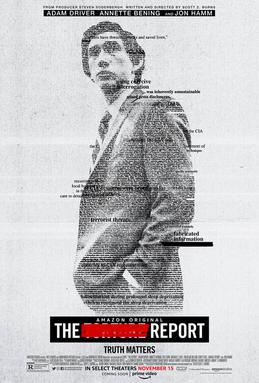
The Report is a 2019 American historical political drama film written and directed by Scott Z. Burns that stars Adam Driver, Annette Bening, Ted Levine, Michael C. Hall, Tim Blake Nelson, Corey Stoll, Maura Tierney, and Jon Hamm. The plot follows staffer Daniel Jones and the Senate Intelligence Committee as they investigate the Central Intelligence Agency's use of torture following the September 11th attacks. It covers more than a decade's worth of real-life political intrigue, exploring and compacting Jones's 6,700-page report. It is partly based on the article "Rorschach and Awe" by American journalist Katherine Eban; that publication was originally distributed by the magazine Vanity Fair in July 2007.

